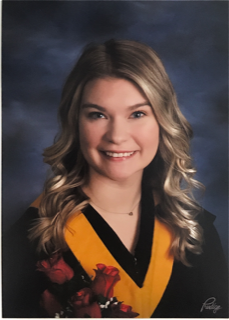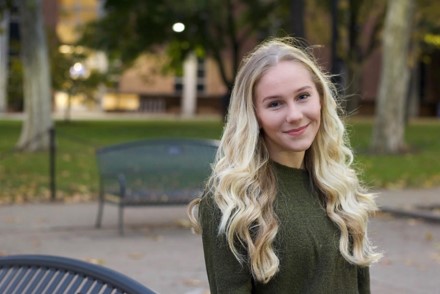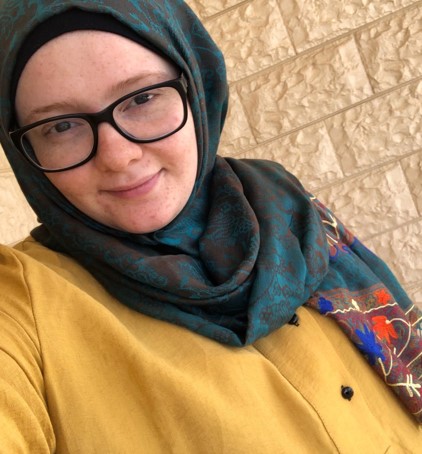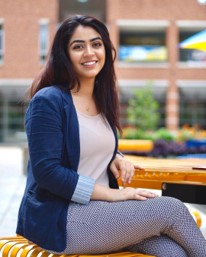The BCN Program commends our 2020 graduates for their signifficant accomplishments. To learn more about this year's graduates and some of the work they have done during their time within the program, check out our overview of the graduating class below:

Kate is a bright young woman who is able to think deeply and critically. Her strong motivation to learn, ability to work well independently and with others, unrelenting work ethic, and congenial personality make her an ideal supervise.
Kate's work on a new construct within the memory and intimate partner violence fields, memory coercion (situations in which an abusive romantic partner challenges the occurrence and/or accuracy of their partner’s memory for an event) is important in building an understanding of the phenomenon.
Using a mixed methods design, Kate explored whether the type and/or severity of the aggression and violence in abuse women's relationships impacted the outcome of the memory challenges (i.e., whether the woman defended the memory, complied with the memory challenge, relinquished the memory, or denied the challenger’s feedback) in a sample of nearly 100 abused women.
Her findings suggests that memory coercion may be yet another means for abusers to control their partners. They therefore have implications for assessing, preventing, and treating intimate partner violence. Her work on this project demonstrates her excellence as a budding scientist and outstanding colleague.
Abby began volunteering in the Mennill Lab in her second year, and worked on a variety of projects that used acoustic approaches to study animal behaviour.
For her Honours thesis, Abby conducted ground-breaking research on vocal learning in wild songbirds, showing that birds exhibit a geographic pattern where birds sound more similar to their neighbours than more distant animals.
Throughout her degree, Abby played an active role in BCNSA including Vice President of Fundraising in 2018-2019 and Vice President in 2019-2020.

Donika joined the Emotion Change Lab 4 years ago. She has contributed to several projects, served as website management, and lab coordinator. Donika is diligent and highly motivated, with a keen interest in research.
Her honors thesis was an exciting initiative that examined the relationship between psychological symptoms of various kinds and narrative structures in the way people write about their past traumas.
She also has been a contributing author to two international conference paper. Her efforts have led her to achieve a number of academic awards and recognitions of her outstanding scholarship.
At the same time, her extra curricular activities demonstrate dedication to training as a health service provider and care giver. Donika is a remarkably resilient and perseverant woman.
Eisha Aujla worked on a project involving the phosphoinositide phosphatase myotubularin related-2 (MTMR2).
Loss of function MTMR2 mutation causes the peripheral neuromuscular disorder Charcot-Marie Tooth, a disease of the myelinating Schwann cells. This disease is the most prevalent neuromuscular disorder in humans and there are over 30 genes that can cause the disorder when mutated. Recently our lab has characterized a loss of function phosphorylation mechanism whereby the serine/threonine kinase ERK phosphorylates and inhibits MTMR2 localization shift to early endosomes where its PI3P substrate resides. Eisha was investigating extracellular signals that could alter the ERK mediated phosphorylation of MTMR2 in Schwann cells. She produced preliminary evidence that neuregulin, a potent Schwann cell growth factor that stimulates myelination, increases MTMR2 protein levels and reduces its phosphorylation suggesting a novel mechanism of MTMR2 activation.
Eisha worked hard and assimilated well with others in the group. The graduate students said she was enjoyable to train and demonstrated high potential for graduate studies if she decides to go that career route. We all congratulate Eisha on her BCN graduation and wish her all the best in her future

Ghadir took an active role on a very interesting research question while she was a third year student in my lab.
Her thesis project was a continuation of that work and examines a question of central interest in psycholinguistic research. Ghadir has made extremely valuable contributions to a large study that is currently being prepared for publication.
Her work on this project showed a sophisticated approach to cognitive science research and a very impressive understanding of the nuances of a very complex question.

Khunsha Altef combined her research skills with her bilingual upbringing to address issues relating to memory and bilingualism.
Khunsha took a very mature and independent approach to conducting her research and it paid off with a unique set of data and a very well written final document. Khunsha spent a couple of years in my lab and has been a real asset.
She is a clear thinker and frequently made valuable contributions to others work. I am grateful for having had the opportunity to work with Khunsha.

Leslee quickly became an enthusiastic and integral member of the lab team, and immersed her self in 3 ongoing research studies. In doing so, she gained experience working with clinical and non-clinical populations, was exposed to numerous techniques necessary to better understand neurovascular regulation, and had the opportunity to join our international Great Lakes Cardiac Rehabilitation Consortium.
Although her thesis project was suspended due to COVID-19 restrictions, she has plans to complete her project, post-pandemic. Congratulations to Leslee for all she has accomplished – particularly during these challenging and unprecedented times!
It’s been a true honour to have Leslee as part of our “HK family”"

Nora Mcvinnie is a very strong student with an excellent work ethic. She developed a very interesting research project based on the simple question “Are good readers always good spellers?” Her approach to answering that question was very sophisticated and creative and well situated in a very complex literature. The answer was surprising and Nora’s work will make an interesting contribution to the literature.
As an excellent writer and natural communicator Nora is very likely to get this work published/ She did an exceptional job on this study and was a pleasure to have in the lab.

Rachel joined my lab in 2017, and demonstrated outstanding motivation and dedication for her research project, the neuroprotective effects of water-soluble CoQ10 and Ashwagandha extract in rodent models of Parkinson’s disease.
Her pleasant and helpful nature, collaborative/group spirit, hard work and dedication for the project led to some very interesting results.
She presented her work as at the annual conference of Natural Health Product Research Society of Canada 2018 in Guelph, ON.
In addition she is also a co-author on four other conference abstracts and on a research paper published last year in Oxidative Medicine and Cell Longevity. I wish her all the best for bright future.

He has been working on assessing the apoptosis inducing activity of various natural extracts in human prostate cancer cells. He was also involved in investigating interaction between chemotherapeutic drugs and natural extracts in vitro and in vivo.
Through his hard work and active participation, he has contributed to the team spirit, good research results and research publication. I wish him all the best for his bright future.

Since beginning in our lab 3 years ago, Maheen has been instrumental in keeping our lab running smoothly- she is always eager to pitch-in and to help her colleagues in any way that she can.
From day 1 Maheen was driven to have a project of her own, she is highly independent and driven. When her 'future' project was discussed with her, Maheen dove into the literature to learn everything that she could about the area. She wanted to be sure that she was as prepared as she could be to tackle her project. The project she took on requires not only a great deal of a deep understanding of the theory and procedures, but also patience and persistence. Maheen exceded our expectations in every way. She is studying the role of a cell cycle regulator Spy1 in the progression and aggressiveness of glioma. One of the main objectives of the study is to characterize tumors arising in mice in the face of Spy1 overexpression. To tackle this objective Maheen is working under the supervision of a pathologist in our lab Dr. Stringer. He is an expert in immunohistochemistry and has high expectations when it comes to the students' performing the assays. Maheen has managed not only to master the tissue processing and staining techniques but she was also praised by Dr. Stringer for the quality of her work. Maheen has obtained valuable results on the tumor characterization which are needed for the manuscript in preparation and will significantly increase the impact on the study.
Since beginning in our lab 3 years ago, Maheen has been instrumental in keeping our lab running smoothly- she is always eager to pitch-in and to help her colleagues in any way that she can.
From day 1 Maheen was driven to have a project of her own, she is highly independent and driven. When her 'future' project was discussed with her, Maheen dove into the literature to learn everything that she could about the area. She wanted to be sure that she was as prepared as she could be to tackle her project. The project she took on requires not only a great deal of a deep understanding of the theory and procedures, but also patience and persistence. Maheen exceded our expectations in every way. She is studying the role of a cell cycle regulator Spy1 in the progression and aggressiveness of glioma. One of the main objectives of the study is to characterize tumors arising in mice in the face of Spy1 overexpression. To tackle this objective Maheen is working under the supervision of a pathologist in our lab Dr. Stringer. He is an expert in immunohistochemistry and has high expectations when it comes to the students' performing the assays. Maheen has managed not only to master the tissue processing and staining techniques but she was also praised by Dr. Stringer for the quality of her work. Maheen has obtained valuable results on the tumor characterization which are needed for the manuscript in preparation and will significantly increase the impact on the study.
She has made some very important observations and her results will go long way in the path of developing a simple nutraceutical therapy for arresting the progression of AD pathology in patients. I wish her all the success in future.

Tamara is a remarkable student. Her enthusiasm for all things, including research and academic success, makes her a joy to supervise.
Her work on the personality factors that predict difficulties with substance use in emerging adults has the potential to drive forward public policy on support for people misusing alcohol and cannabis in the future.
Her willingness to learn the subtlties of Qualtrics, to collect data from up to 400 participants, and to learn complex statistical analyses is evidence for her overall excellence.
The fact that she regularly made her lab-mates laugh and brought joy to our research group were an unanticipated bonus.

Lauren is quiet & hard-working. She is focused on her task, invests her time in perfecting the outcome rather than small talk or bonding over listing the obstacles we have to overcome to get the work done.
She keeps her eyes on the prize - which may just be around the corner

He recorded sound-driven responses from neurons in a key hearing-related brain centre name the inferior colliculus. He used neural signals to determine how the sensation of one sound can be affected by another sound in the environment. He wanted to find how this effect was dependent on differences between two sounds in acoustic quality, timing, and location as well as other factors such as signaling molecules in the brain. This research is important for understanding hearing in a real-world situation. During his thesis research, he collaborated very well with a graduate student and another undergraduate student. Results collected by the three people will be combined in a manuscript to be submitted for publication.
Nick wants to pursue a career in neuroprosthetics, which was among the major reasons why he joined my lab to learn to record neurophysiological signals from specific brain regions. Eventually, Nick wants to build intelligent medical devices based on circuits and neural activities in our nervous system and use these devices to help patients such as those with amputations. I wish him all the best for his future career
Mustafa Abumeeiz and Joshua Zegrean
Dr. Huiming Zhang
Mus and Josh are best buddies who always help each other and do things together. They joined my lab together and worked on different aspects of the same project for their undergraduate thesis research
Their project is on a specific nerve bundle that connects left and right sides of a hearing-related brain structure. They tried to identify detailed wiring related to the fibre bundle and determine the neurochemicals used by the bundle. Results could be used to explain how animals combine acoustic cues obtained from both ears to enhance sound detection in a complex acoustic environment. Due to the COVID-19 pandemic, they couldn’t complete these experiments. However, their pilot studies will benefit future research related to their project.
Mus’ career goal is to become a medical doctor while conducting research in gerontology. This is important for the aging population in Canada. Mus did very well in his MCAT and is currently gaining medicine-related experiences. I wish him all the best in his medical school applications and future career.
Josh’s career goal is also related to medicine and health. He is interested in combining knowledge and skills in economics, policy, business and medicine to enhance health in a global context. This field is particularly important under situations such as the current COVID-19 pandemic, as a global effort is needed to deal with these situations. I really hope that Josh can become a future leader in this field.

Jordan completed his thesis with me between October 2019 and April 2020. It was a pleasure to have him as the very first undergraduate student in my lab.
He took on a challenging and novel project looking at whether encouraging retrieval of rich, episodic details can boost memory for people’s names, an important memory concern for many people, especially those with memory impairments. He taught himself to use a new psychology experiment software to program the experimental tasks himself.
I wish Jordan all the best in his future career and thank him for his contribution to my lab.

Since joining the Development & Etiology of Anxiety & Related conditions lab 2 years ago, Brooke Carter developed a keen ability to read and critique empirical scientific literature including expertise in the contribution of distress tolerance to psychopathology. She then identified a novel area of inquiry and designed a methodologically sound study to document the broader implications of distress tolerance for the well-being of university students.
Brooke has consistently been conscientious, diligent, and thoughtful about translational research. As she moves on to graduate training, I am excited to follow her bright career in research and healthcare.

Morgan is a dynamic student who is passionate about research.
She examined whether or not public interactions with species at risk fish (Lake Sturgeon) increased their stress using a clever experimental design where she took advantage of tanks with and without windows and simulated crowd noises etc.
Morgan's work advanced so well that she presented her findings in January at a national conference.


